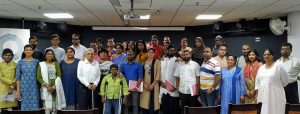On 15th May, we organised a consultation on our Equality Bill 2019 (“Bill”) in Hyderabad. The CLPR team presented the provisions of the Bill and sought suggestions, inputs and feedback from the participants, which included various academics and members of civil society organisations working with marginalised groups.
This blog post presents the key points of the consultation. Click here to read the Consultation report, and here for photographs of the event. The Agenda of the Consultation is available here.
The Consultation began with an introduction on why we need a single equality law. It was highlighted that existing legislations and constitutional provisions fall short of addressing discriminatory practices against certain groups including transgender persons and persons with disabilities. Existing anti-discrimination laws also have various shortcomings, as they do not address discrimination by the private sector. Further existing legislations such as the caste discrimination laws only provide for only criminal offences and do not provide civil remedies for discrimination.
The discussion then moved on to the specific provisions in the Equality Bill 2019. We presented on the various protected characteristics which are the grounds on which discrimination is prohibited and how they were defined. The protected characteristics under the Bill presently include caste, race, ethnicity, descent, sex, sexual orientation, gender identity, gender expression, tribe, nationality, disability, marital status, pregnancy, health (including HIV / AIDS status), occupation, political opinion and belief, linguistic identity, place of birth, age, migration, religion, refugee status, socio-economic status, occupation, food preference or any combination of these characteristics.
We later moved on to the prohibited conduct which includes direct and indirect discrimination, victimization, hate speech, dissemination of hate speech, segregation and boycott and lynching and discussed each of these. In the session on specific areas of discrimination, the Bill addresses equality in specific areas such as education, employment, healthcare, land and housing and public places. There was a vibrant discussion on the prohibited conducted and many important suggestions made.
In the post-lunch session Avinash Shahi presented Equality Commission established under the Bill. He presented on what the functions of the Central Equality Commission under the Bill would be and its powers and duties. The session concluded with Deekshitha Ganesan’s presentation on the workings of the Equality Court and Remedies.

